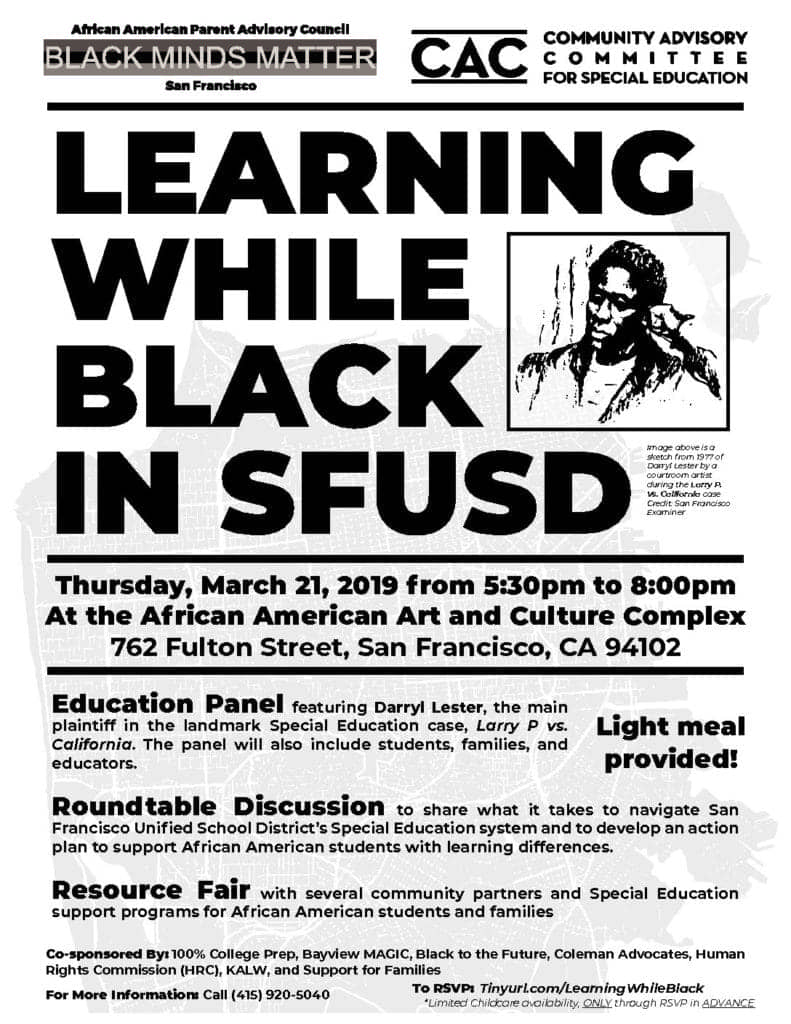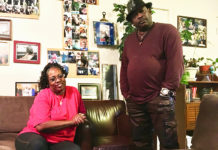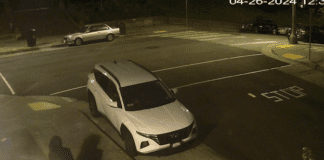‘Learning While Black in SFUSD’ Thursday, March 21, 5:30-8 p.m., at the African American Art and Culture Complex, 762 Fulton St., San Francisco – Dinner and childcare provided plus Panel, Roundtable Discussion and Resource Fair – YOU are invited!
by Lee Romney

This is part of an ongoing series “Learning while Black: The fight for equity in San Francisco schools.”
Today we’re bringing you a personal story: Three generations of one African American family talking about their experiences in traditional San Francisco public schools. Elsie Stewart retired a decade ago as a supervisor at the Four Seasons Clift Hotel in Union Square, where she worked for more than 40 years. Her son Emmanuel is an elementary school principal. And grandson Shaquill? He works in a San Francisco public school now too, while studying radio on the side. They all still live in the City.
Emmanuel: My name is Emmanuel Stewart, I am the father of Shaquill Stewart, eldest son of Elsie Stewart, and I graduated from George Washington High School in 1980, and I’m also the principal here at George Washington Carver Academic Elementary School for San Francisco Unified School District. I’m 56.
My early memories of school are at Anza Elementary School, being able to walk to school with our community at that time. A lot of us went to the same school and so we enjoyed walking to school. We also, some of us went to the same church and if we didn’t go to the same church the churches that we all attended were pretty close to each other.
Shaquill: My name is Shaquill Stewart. I am the son of Emmanuel Stewart and the grandson of Elsie Stewart. And I graduated from George Washington High School in San Francisco. Class of 2011. I am 25. I started off at Sheridan,
Emmanuel: And then you went to Charles Drew for a minute, for a hot minute.
Shaquill: Oh, yeah, I went to Charles Drew for a hot minute. I remember that. That was probably the closest school being around people of color. Ha ha. We were bad too. We were (Emmanuel: Not bad, inappropriate), we were bad. I know we were bad (Emmanuel: Inappropriate behavior.)
We were bad, but it was a lot of fun going to Charles Drew for that short time. And Argonne – it was more out in the avenues. It was me and another African American that was in my class. Demetrius. I remember him specifically and it was always me and, me and him became really close friends because it was just us. (Emmanuel: Ha ha.) How about you Grandma?
Elsie: Well. My name is Elsie Stewart. My age is 77. I was born in Shreveport, Louisiana, and I am the mother of Emmanuel Stewart and the grandmother of Shaquill Stewart. When I came here from Louisiana, I went to Roosevelt.
Teachers was friendly. And I didn’t have any problems getting along with the kids. Because it was a lot of African American childrens going there and we got along well together. And after Roosevelt, I went to Poly. They were friendly also, because it was a lot of Black kids there also.
And we had fun, we had played volleyball in the back, but I wasn’t good at volleyball. Ha ha ha ha. Not at all! Because I was kind of a shy person. I’m just getting out of that since I’m getting older. I always remember (Emmanuel: She was) one of my teachers her name was Miss McPhee. She was a really nice teacher. She talked to us very well and I liked her.
To this day, I fight all of that, the whole stereotype of children who can’t learn. I just don’t believe that.
Emmanuel: Well, I’m glad you remember some of them. As I got older and we were bused out of our community, that’s when school became not as enjoyable any longer. The busing situation for us in the ‘70s, it was more of supporting somebody else’s notion that Black children should be integrated with other children and not attend the schools in their community anymore.
We were bused from the Western Addition to the Richmond and Sunset. One worst incident that I do remember: When I got outside that day, it was many of the boys who caught the bus with me that were on the bench and it was about 20 of us. They were accusing the boys of doing something at that time, but the entire busload of us were on the bench for one lunch period and a couple of recess periods.
I remember sitting on the hot bench on a hot day, for something we don’t know if we did something or not. And so, a lot, a lot of mixed emotions when it comes to elementary school. Not so much with middle and high school. What was you gonna say, Shaquill?
Shaquill: I wasn’t gonna say anything.
Emmanuel: I know you was gonna say something.
Shaquill: Ok. My one memory I do remember playing dodgeball with these kids and the Asian kids and all that and I remember like I got a younger Asian kid out in dodgeball. I remember he got mad and he threw the ball at me and he called me the n- word.
And I remember hearing that for the first time, like, wait, did he just do that? So my first instinct was I wanted to fight him, but I didn’t. But, so I went and told the teacher, Miss Eigel. It really set boundaries at the school for what you can do and what you cannot do around the African American students and it, it put me in a different spot because I didn’t really hang out with those kids anymore.
And that’s when I really started hanging out with Demetrius. Demetrius was disabled as well so he couldn’t walk (Emmanuel: Yes, he was. He was in a wheelchair.) He was in a wheelchair and he had crutches for a lot of the time too.
Middle school was fine for me. I loved going to MLK. MLK was a lot better because it was more African American students. Actually, we had a lot more African American teachers there. Two specifically. Mr. Bryson in sixth grade (Shaquill and Emmanuel: Who’s still there now, who’s still there) and also Miss Gibson, who taught language arts.
She was tough, but she was really great. I remember one class that she did with us. She did a whole class on etiquette. And I remember we had to come in; we had to teach us how to wear a tie.
Emmanuel: OK, I just remember particularly at Madison Elementary School and they were not friendly at all. And they didn’t understand that we had a strong work ethic. Many of those educators didn’t understand that we attended school, we attended Sunday School.

So if you didn’t know, Shaquill, why your mom is always stressing this whole thing behind church and school and Sunday School and things like that, it comes from this background that many Black folks believe that’s where you get your formal training at, is in church. In elementary school I still to this day cannot ever remember reading in elementary school, but often remember reading in Sunday School.
Shaquill: And it’s, it’s a funny thing because when I was in elementary school, I read all the time but I read to him. So my memories are mostly reading books to him or my mother, either at night or when I get home or something like that. I remember I read a book and he fell asleep, I read it so many times.
Elsie: I don’t have no memories of having a bad experience at school when I was going. (Emmanuel: No.) Not whatsoever. (Emmanuel: No. You wouldn’t). Well! (Emmanuel: I’m just saying.) We, we was kind of a quiet bunch of kids back then, that’s what it was. (Emmanuel: Yeah.) We were quiet.
Emmanuel: That’s the end of that conversation. It’s just I wasn’t. (Elsie: Oh yeah, I know.) Right. And tried to disrupt everything within the system because the system was to us a broken system.
And a lot of the cats that I went to school with were you know put up in remedial classrooms or special ed classrooms. They shouldn’t have ever been even considered to be put in classrooms where they couldn’t achieve at. To this day, I fight all of that, the whole stereotype of children who can’t learn. I just don’t believe that.
Shaquill: To me, when I got to high school, at George Washington, I don’t think I got the best education that I could have gotten there. And a lot of that was a little bit of me too. I didn’t do what I was supposed to do, and a lot of it also was the school itself, because there was so many kids there.
They didn’t really focus on Black kids that went to Washington. Start of freshman year we had like 30. Now when we graduated four years later, I think we had probably half that. I didn’t feel like I was getting the most from the teachers. I had five different counselors in four years, I had two in one year. I had one that left (Elsie: Mmhmm.) I had one that quit (Emmanuel: All fact), and another one that left.
Emmanuel: I got upset with everybody up at the school, and then I became the angry Black man up there and so my wife had to take over. She’s more calm than I am. Stepped in and intervened a couple of times, got him back on the right track and then he finished.
Shaquill: It was predominantly Asian. They just were more pushing towards them, it felt like. And if you were Black and you were an athlete, you were fine. Like they will help you out; they will do whatever. But if you weren’t an athlete, if you were just me a regular student then you were just like, you were just lost somewhere.
They wanted to do a program with the African American students that were there. They wanted to put us all in classes together, AP classes together, and they told us they were gonna try to do that and then when we started that next semester they didn’t do that. I was in AP Economics by myself.
So they separated us. I think building community with somebody that looks like you helps enrichment for you to learn a little bit better. I got a lot better when I went to Skyline College in San Bruno. My writing got better. I did HBCU tours, which made me want to go to Talladega, which is a historically Black college in Alabama, which I enjoyed and I did well there. I was Dean’s List two years.
Elsie: Well, I didn’t go to college. When I got out of high school, I got little part time jobs and I did that for a while and then, went and got married and had him. Ha ha ha. (Emmanuel: Very funny.) But it was fun. (Emmanuel: Very funny.)
Emmanuel: I knew my mother had met my father relatively young and then had to make sure that I was provided for. I think I was about 11 when they finally just said enough is enough. She had enough of that nonsense with that dude.
He tried to stay in the picture as long as he could, I mean as a father. He stayed in the city and worked really hard as a warehouseman. Teamsters. He did make sure we had health insurance and paid his alimony on time to make sure that we stayed in school.
Elsie: And the other two kids, they did good. They went to college and finished it. But I didn’t have any problems with my kids, none whatsoever. I didn’t have to go to juvenile, anything like that. Police wasn’t called or anything.
They were a bunch of nice childrens; they really was. So, I just wish maybe I should have got more of an education, but I didn’t. But, I’m good. I raised ‘em. And now they raised, he’s raising his own and they, they really doing good in the jobs that they have. So, I’m proud of ‘em.
This story in the series, Learning While Black: The Fight for Equity in San Francisco Schools, was reported with the support of the Fund for Journalism on Child Well-Being, a program of the University of Southern California Center for Health Journalism. It was originally published and broadcast by KALW on Crosscurrents, at https://www.kalw.org/post/one-african-american-family-half-century-experience-sf-public-schools, and generously shared with the Bay View.

 Store
Store



